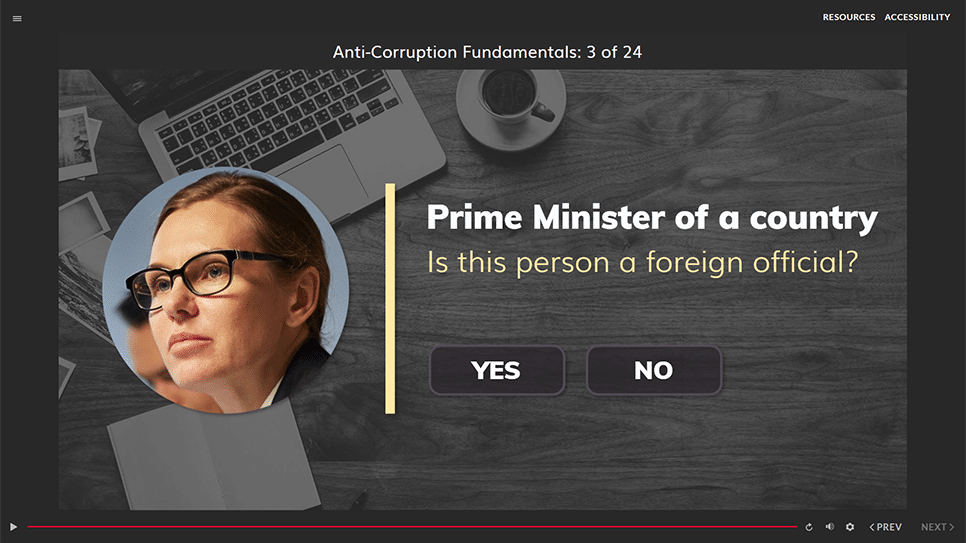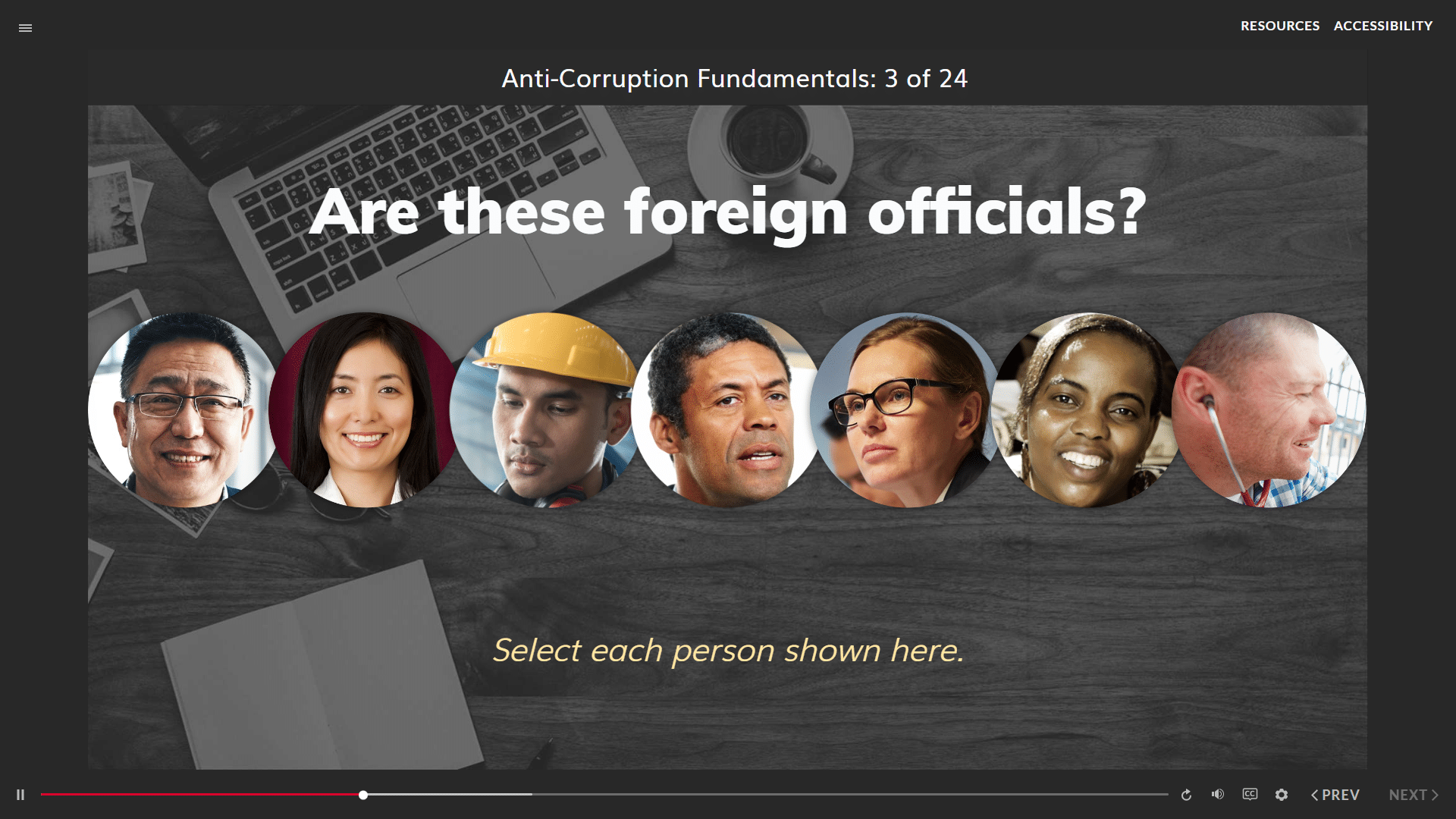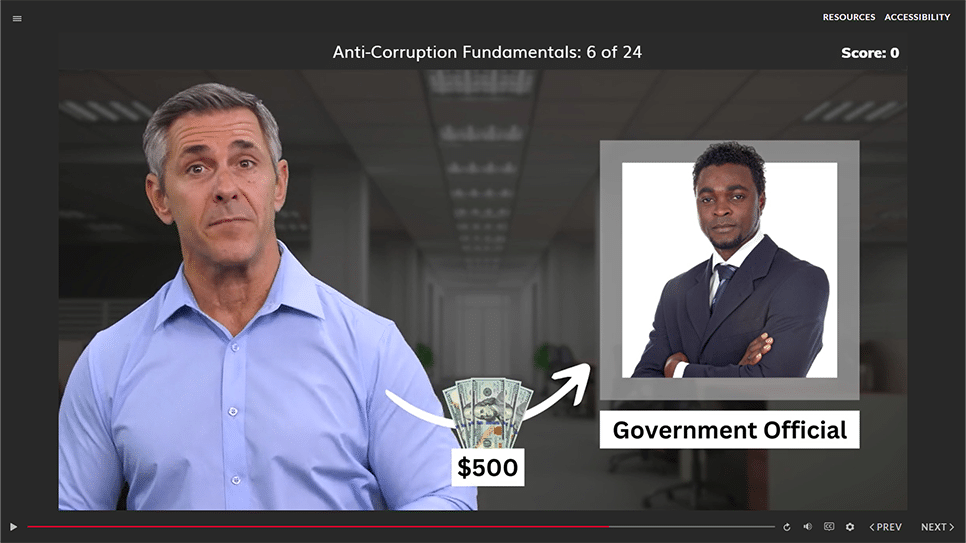FCPA Online Anti-Bribery, and Anti-Corruption Compliance Training
Knowing that bribery is a crime is just the first step. Training employees on why anti-bribery laws matter and what to do when they spot possible bribery creates a clear path to handling situations that involve uncertainty.
Better everyday decisions
From stock tips and donations to trade secrets and facilitation, teams will learn how to handle the many legally murky situations they may encounter and be empowered with the confidence to act decisively.
This training covers these topics and more:
- Relevant bribery and corruption laws, including FCPA, UK Bribery Act and other international laws
- Dealing with public officials
- What is a public official and who is considered one
- Anything of value – what is acceptable and not acceptable/li>
- Facilitation Payments
- Penalties for violating bribery laws
Overview
FCPA, Anti-Bribery and Anti-Corruption Training
Each year businesses and individuals pay an estimated $1.5 trillion in bribes. This pervasive issue doesn’t just siphon financial resources; it undermines economic growth, stunts development, destabilizes governments, and threatens democracy. Worst still, it creates fertile ground for criminal enterprises, terrorists, and traffickers to thrive. Recognizing the severity of this threat, the US Securities and Exchange Commission and other global governing bodies have implemented stringent laws with severe penalties to combat bribery and corruption.
Foreign Corrupt Practices Act (FCPA)
The Foreign Corrupt Practices Act (FCPA) was enacted by the US Congress in 1977 after it was discovered that US companies were spending hundreds of millions of dollars each year to foreign governments and officials in what were most likely bribes. The FCPA was passed both to restore public confidence in the integrity of American businesses and to promote the stability of foreign governments. The FCPA is enforced by the U.S. Department of Justice (DOJ) and the Securities and Exchange Commission (SEC).
UK Bribery Act 2010
The UK Bribery Act 2010 has been described as the toughest anti-corruption legislation in the world. The Act prohibits bribery of any domestic or foreign official by UK companies and citizens wherever they are doing business. The Act’s prohibitions also apply to persons with close connections to the UK and, in some circumstances, to non-UK companies and individuals.
A new strict liability offense applies to companies that fail to prevent a bribe, where the only defense is a demonstration that the company had in place a robust anti-bribery and anti-corruption compliance program. The Serious Fraud Office (SFO) prosecutes high-level bribery and corruption cases under the Act.

Anti-Bribery and Anti-Corruption (FCPA) Training
Traliant’s Anti-Bribery and Anti-Corruption (FCPA) training is a 20-minute course that uses a variety of interactive scenarios and learning exercises to help employees understand anti-bribery and anti-corruption rules and how those rules impact them in their work. The course will help learners understand what types of payments and gifts are prohibited, what facilitation payments are and when they may be legal, and the difference between paying a bribe and being extorted in crisis situations. Employees will also be required to review your organization’s anti-bribery and anti-corruption policy within the course and will learn about the penalties for violating anti-bribery laws, including criminal penalties and fines.

Realistic Workplace Scenarios
Staying clear of bribery and corruption might seem like common sense for most US workers but based on the frequency and magnitude of FCPA compliance violations in the country, it’s easier to commit a non-compliant act than one might think.
To illustrate this, our FCPA training course features several depictions of real-life scenarios that can often lead to an FCPA violation. By immersing participants in these depictions and allowing them to empathize with a worker that breaks an FCPA regulation, viewers are more likely to be able to recognize similar situations as they arise in their own workplace and avoid committing a violation
The Traliant Difference
Proven effective training
Traliant creates modern, interactive training courses to help organizations meet the challenges of today’s workplace.

Engaging Instructional Design
We’ve applied the latest in learning innovation to ensure that learners have a positive experience and retain the knowledge for future recall.
Learn More
Customization
We can quickly and efficiently customize the content and images to be unique to your organization.
Learn More
Accessible to Users with Disabilities
Traliant provides an inclusive experience for all users, including those with disabilities, by going beyond Section 508-C standards and offering WCAG 2.1 AA.
You may be interested in other courses from the same topic

Corporate Compliance and Ethics
11 courses
Connecting employees to your core values.
11 courses

Tailored for Your Organization
Supported in over 100 languages, Traliant’s training courses can be tailored with an organization’s branding, images, policies, and video message to provide employees with a custom experience.
Help your employees make the right decisions, at the right moments

